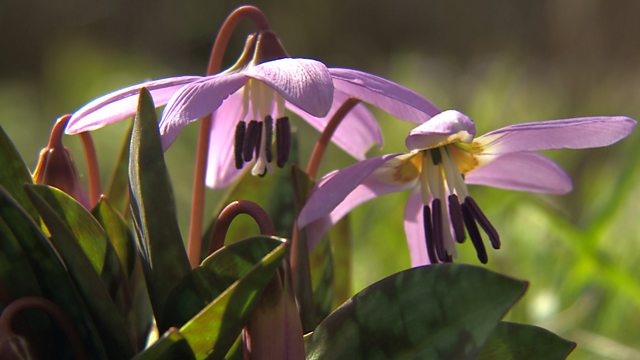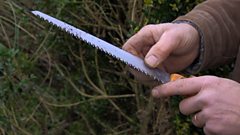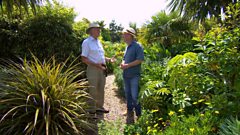
Episode 2
Gardening magazine. Monty Don tackles the problem of box blight, while Joe Swift visits a gardener taking on the challenges of gardening on the windswept Cornish coastline.
Monty Don and the team present a programme brimming with topical advice and inspiration for garden lovers.
Monty tackles the problem of box blight in his garden at Longmeadow. It means taking drastic action, but in the long term will hopefully be for the best.
Carol Klein looks at the spring delight that is the cyclamen. She meets one of the country's leading experts in this most delicate of hardy plants and uncovers just how easy they are to grow.
Joe Swift visits a gardener taking on the challenges of gardening on the windswept Cornish coastline, to create a haven of beauty against the odds.
And we meet an amateur gardener who breeds a stunning array of sweet peas to make the most fragrant and colourful displays.
Last on
Clips
-
![]()
Monty tackles box blight
Duration: 02:42
-
![]()
A Cornish clifftop garden
Duration: 02:53
Box blight

The dreaded box blight is becoming more and more widespread. It is a fungal infection which is rarely fatal to the plants but is very unsightly. Two pathogens are responsible – Volutella buxi and Cylindrocladium buxicola, they often occur together, but the latter is the more virulent.
Early signs are dark, circular areas on the leaves which spread and gradually cause the leaves to go brown and fall off. Dark streaks can also sometimes be seen on the bare stems. In hedges, irregular, bare leafless patches appear – often along the top. V. buxi primarily enters through wounds in the leaves – for example, after clipping. The spores of both types of blight are sticky and are either water- borne or carried on tools, gloves, people and animals. Sadly, there is no cure available and, as yet, no resistant varieties of box.
If you suspect that your box plants are blighted, you could try cutting (or digging) out the affected parts and destroying them. Don't put them on the compost heap. Clear up any dead leaves as research has shown that the fungal spores can persist on both the foliage and in the soil for up to 5 years.
If your garden is still blight free give your plants the best chance by improving their cultural conditions. The fungus thrives in a damp cool environment, so place them in an open, sunny situation; they need good ventilation and a well-drained soil. Avoid letting other plants smother your box hedges. Keep them on the dry side and water them at the roots if really necessary, try not to wet the leaves. When it's time to clip your hedges and topiary, choose a dry spell, and always disinfect your tools as you move from one area of box to another. Garden disinfectants are available at garden centres. Finally, it might be safer to propagate new plants from your own cuttings, rather than bringing them in from outside.
(www.rhs.org.uk)
Cornish garden featured
When planning his wonderful cliff top garden in Cornwall, David Eyles decided it was ‘the garden or the view’, because he knew that most of the plants he wanted to grow would not survive exposure to the wind. He chose to have a garden and needed a protective hedge. The plant he selected was Olearia traversii, a native of the isolated Chatham Islands off the east coast of New Zealand, which must be one of the windiest places in the world. It is evergreen and has white, daisy-like flowers in summer.
Hedges make great windbreaks because they filter the wind rather than block it. A good hedge will give full wind protection for roughly 5 times its height. For example, a 3m hedge protects 15m of garden. Other choices for a windy, coastal situation could be Escallonia, Eleagnus x ebbingei and Griselinia littoralis - all of which are evergreen.
If you would like to visit David’s garden, it is open for the NGS on Sunday 15 June and Sunday 20 July. For more details, check out the website below.
(www.ngs.org.uk)
Cyclamen garden featured

Carol saw the wonderful display of Cyclamen coum at Birmingham Botanical Gardens and chatted to Vic Aspland, president of the Cyclamen Society. He showed her photos of his trips to remote, snowy hillsides looking for cyclamen growing in their native habitats. Carol shows us how easy it is to grow cyclamen from seed at home and see the variations in flower and leaf colour that can arise.
The Botanical Gardens are open every day of the year except Christmas Day and Boxing Day, for times visit the website below.
Birmingham Botanical Gardens
Westbourne Road
Edgbaston
Birmingham
B15 3TR
Tel: 0121 454 1860
(www.birminghambotanicalgardens.org.uk)
Jobs for the weekend: Cut back epimediums

Epimediums are lovely woodland plants grown for their attractive foliage and delicate flowers. They are tolerant of dry shade which makes them very useful in the garden. In early spring, the old bronze winter foliage should be clipped off to reveal the emerging flowers.
Epimedium perralchicum ‘Frohnleiton’ is a good variety with golden yellow flowers in April and May. Another good one is Epimedium ‘Pink Elf’ which has pink blooms from March right through to June.
(www.rhs.org.uk)
Jobs for the weekend: Sow tomatoes
Now’s the time to look forward to a taste of summer and sow your tomatoes. Regardless of whether you’re going to grow them outside or in the greenhouse, start them off in a seed tray or pots and put them in a warm place to germinate. As soon as they are large enough to handle, pot them on until they are ready to plant in their final position.
(www.rhs.org.uk)
Jobs for the weekend: Sow broad beans
f you’re itching to get going on your veg plot, you can make a start now with broad beans. If your soil is still cold and wet, start them off under cover in 3in (8cm) pots and plant them out in a few weeks time. But if your soil is warming up nicely, you can sow them direct. Sow them in a double row leaving 9in (25cm) between each seed and 2ft (60cm) between each double row.
(www.rhs.org.uk)
Credits
| Role | Contributor |
|---|---|
| Presenter | Monty Don |
| Presenter | Carol Klein |
| Presenter | Joe Swift |
| Series Producer | Christina Nutter |
| Series Editor | Liz Rumbold |
Broadcasts
- Fri 14 Mar 2014 20:30�������� Two except Northern Ireland
- Sat 15 Mar 2014 19:00�������� Two Northern Ireland
- Sun 16 Mar 2014 09:25
- Thu 27 Mar 2014 10:05
Featured in...
![]()
Gardeners' World
Gardening show packed with ideas and timely reminders to get the most out of your garden



